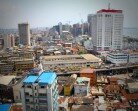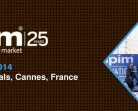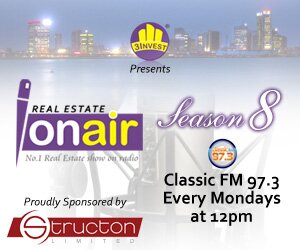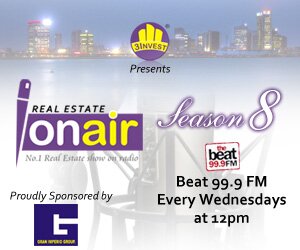Friday , 28 March 2014
Headlines
- Lekki-Ikoyi toll illegal court says
- New Lagos Computer Village requires 20 Billion Naira
- EHINGBETI 2014: Powering the Lagos Economy: Real Opportunities, Endless Possibilities
- Nigerian Economic Summit to focus on Education
- Construction of 2nd Niger Bridge kicks off
- Fraud Alert: Beware of Ayobo land – Lagos Land Bureau
- NIESV becomes govt official property valuers and managers – BPP
NIGERIA ECONOMIC OVERVIEW & WIDER ECONOMIC TRENDS: Q4 2012 – Q1 2013 | MCORE

NIGERIA ECONOMIC OVERVIEW & WIDER ECONOMIC TRENDS: Q4 2012 – Q1 2013
Economic Overview
The Nigerian economy has faced numerous challenges over the past 6 months which have impacted overall economic activity up until the end of 2012 and into 2013. Declines in the real growth rates of economic activity were experienced in both the oil and non-oil sectors. Oil production was less than expected due to security challenges, and floods which occurred in the latter part of the year, while the non-oil sector (notably Agriculture, Wholesale & Retail Trade) was mostly affected by the floods and weaker consumer demand.
GDP Growth
Gross Domestic Product (GDP) grew by 7.1 per cent in Q4 2012, compared with 6.9 per cent in Q3 2012. Q3 figures showed a decline of 0.38 percentage points from the 7.37 percent recorded in the third quarter of 2012. GDP grew by 6.34 percent in the first quarter and 6.39 percent in the second quarter of 2012.

Inflation
February 2013 inflation rate stood at 9.5%, an 0.5% increase on the January rate of 9%, the lowest it had been on a month by month basis since early 2008. End-period headline inflation rate (year-on-year), for the fourth quarter of 2012, was 12.0 percent, compared with 11.3 percent for the preceding quarter and 10.3 percent recorded at the end of Q4 2011. Inflation rate on a twelve-month moving average basis was 11.7 percent for the month of February 2013 compared with 11 percent in the corresponding quarter of 2012.
In relation to prices, the inflation rate is expected to moderate significantly going forward. The inflation rate is projected to average about 9.8% through 2013. These projections are driven by the assumptions that the CBN will continue to promote moderate monetary policy and domestic fuel price stability.
Power Sector Reforms
Huge expectation continues to trail the much awaited reforms in the power sector. The settlement of outstanding benefits of Power Holding Company of Nigeria (PHCN) staff, the signing of a long term management contract with Manitoba Hydro International of Canada to manage the transmission network and the purchase and transfer of ownership of Power Holding Company of Nigeria (PHCN) distribution and generating companies to the private sector all bode well for much needed and hugely improved power supply in Nigeria.
Oil and Gas Reforms
With vested interests continuing to kick against reform in the oil and gas industry, ongoing delays to the passage of the Petroleum Industry Bill remain a major disappoint in the much awaited economic reforms process which was expected to improve revenues from the oil sector, increase efficiency and reduce the endemic corruption prevalent in the sector. Meanwhile international investment in the oil and gas sector continues to remain on the sidelines due to the uncertainty in the sector.
Foreign Direct Investment
Even with delays in government reforms, international investment continued to increase with foreign direct investment (FDI) reaching a record N800 billion ($5.2Bn) in the year to January 2013. The IMF projects FDI to grow to $7.3 billion this year, $8.7 billion next and $9.6 billion in 2015. Foreign Direct Investment (FDI) inflows increased by circa 207 percent over the same period last year, highlighting investor confidence in the overall Nigerian economy. Inflows and investment commitments were focused on infrastructure development, construction of power plants for the enhancement of electricity generation, mining, healthcare, agriculture and agro-allied sectors of the Nigerian economy, areas where there have been concerted efforts to turn things around.
With lacklustre economic growth in most developed economies and a downturn in the economic engines of the BRIC countries of Brazil, Russia, India and China, international investors are showing increased interest in frontier economies and in particular in the newly created economic block of the MINT countries which include Mexico, Indonesia, Nigeria and Turkey. This new economic block consists of countries which display strong economic growth supported by a growing middle class with economic spending power. The MINT countries are believed to have long term investment potential and economic benefit. Africa in general also features very prominently in international investor interest with a recent survey conducted by The Economist Group of 217 global companies based in 45 countries reveals that expansion in Africa is a priority for two thirds of them within the next decade.
Infrastructure Development
Lagos continues to make giant strides in infrastructure development with ongoing planning, development and implementation of a number of infrastructure projects including the Lagos Urban Rail Mass Transit project, the Lekki Free Trade Zone, Lekki-Epe Expressway, Badagry Expressway, Lagos Independent Power Projects, the Lekki-Epe International Airport, the construction and rehabilitation of roads in all the local government areas of the State, Lekki Seaport and Lekki-Ikoyi Link Bridge. These projects are either being funded by the state or under Private Sector Partnerships as a joint venture between private institutions and the state government.
Security Issues
The security situation continues to cause unease with the proponents of violence which started in the northern part of Nigeria seeking to export their extremist views through violence to the rest of the country. However, there appears to be a greater sense of purpose by the Federal Government to halt the incessant loss of lives and complete disregard for law and order. The Federal Government is actively seeking both military and non-military means to end the sporadic outbreaks of violence and it is hoped that a solution is found soon because without a concerted effort to put an end to the violence, it will continue to remain an impediment to international investment and attendant economic growth.
2. REAL ESTATE TRENDS
3.1 LAGOS REAL ESTATE MARKETS
The Lagos real estate market continues to benefit from the gains derived from a stable and progressive state government committed to improving the state infrastructure, rule of law, governance and security. Lagos continues to remain an attractive destination for real estate investment in Nigeria and Africa based both on land and property appreciation and also in terms of achievable rental returns. Real Estate investment continues to flow into the retail, residential and office sectors with ongoing development in up-market residential estates, development of modern shopping malls and numerous new office developments in the pipeline.
Lagos and Abuja have been listed among the top four cities in Africa with the highest cost of living, according to an index released by the Economist Intelligence Unit. The survey places Abuja as the second most expensive city in Africa second only to Luanda, Angola while Lagos comes fourth. The survey backs a recent report by Knight Frank which identifies Luanda as having the most expensive commercial office space in Africa beating Lagos to second place.
Lekki-Epe Axis
The Lekki-Epe axis continues to develop at a rapid pace, fuelled by the continuing development of the Lekki-Epe Expressway, a private tolled road that runs from Victoria Island to Ajah and beyond to the outskirts of Lagos. The expressway has opened up out of town areas on the outskirts of Lagos and has caused price rises in formerly difficult to reach areas. One has seen the development of numerous residential estates along the axis and as densities continue to rise, there is an expectation that retail and commercial development will continue apace. The Chevron campus is a well known landmark and the cache of the Chevron name has attracted a number of middle class estates to be developed in the immediate area to cater for housing for well paid oil sector workers. Prime residential land in the immediate area can go for as much as US$700 per m2 however yields are low at circa 5% and below.
The area offers a good road network, good security and is considered affluent. With the opening up of new areas via the expressway the area continues to draw both renters and owner-occupiers. This bodes well for property and land asset prices and it is expected that demand pressure will continue to cause price rises for the foreseeable future. Potential infrastructure development at the Epe end of the axis remains a strong driver for future growth with the Free Trade Zone and proposed Sea and Airports offering potential for huge future development and economic growth in the area.
3.2 REAL ESTATE FINANCING
The high cost of financing at rates of 20% per annum and above before fees makes development of real estate projects challenging in the local markets. In addition, local banks have been put off by the long gestation periods of two to five years before developments start to yield returns. Banks had traditionally found the short turn-around hyper returns of oil trading and importation a lot more attractive. Where banks are willing to invest, majority are seeking cash investments of up to 40% of the cost of development of the project while also seeking long leases or pre-sales of a similar percentage before they show any interest in providing debt funding for projects. The stringent conditions and high cost of financing continue to dampen the enthusiasm of local investors for investment in real estate development. The recent failures of numerous oil trading businesses brought about by the tightening of regulation in the oil trading sector has shown that hyper returns often come with hyper risks.
However, the silver lining is that international funders and investors are showing greater interest in the local market and are able to access international funds and use them to finance local developments at rates well below what is available from local banks. As offshore funds continue to make in-roads into the local market, hopefully, this will encourage the local banks to re-consider lending to well planned, good quality real estate projects.
3.3 PRIME LAND PRICE MOVEMENTS
Victoria Island, Ikoyi, Banana Island, Oniru & Lekki 1 price per m2– 18 Months (Sept 2011 – March 2013)

With over 18 months of data, we are able to validate price movements for prime Lagos land over a longer period than one year. Victoria Island prices appear to be on a decline, with a price of N289,000 psqm in late 2011 compared to a current price of N239,000 psqm to date, showing a decline of 17% over the 18month period and a decline of 7% over a 12 month period. Victoria Island price falls contrast with Ikoyi prices which in late 2011 were at a discount of 30% to Victoria Island prices but today, 18 months later, have recovered to a point where they are now 11% higher than Victoria Island prices. Old Ikoyi prices are now the highest in Lagos at circa N265,000 psqm regaining their position as the most expensive land in Lagos. Banana Island continues to show the greatest price appreciation over the 18 month period of 63% and an appreciation of 6% over the last 12 months with the greatest appreciation over the 18 month period in early 2012.
Lekki 1 prices at N116,000 psqm closely match Oniru prices at N120,000 psqm. However Lekki 1 prices have appreciated 28% over the 18 month period while Oniru prices have not moved at all with a negative growth of -2% over the 18 month period. On this basis, Lekki 1 appears to be benefiting from vibrant residential and commercial demand and the uplift already taking place with the expected opening of the Ikoyi-Lekki link road. The pricing differential between Ikoyi land at N265,000 psqm compared to Lekki land at N116,000 psqm or 44% the value of Ikoyi land plus the ongoing strong price growth of Ikoyi land does suggest there is considerable room for growth in Lekki land prices as the prices of the two areas are expected to show greater convergence once the link bridge is opened.
3.4 THE RESIDENTIAL MARKET
The Lagos residential real estate market is showing signs of increased vibrancy once again. Lagos continues to remain a growing and dynamic city with demand for housing being driven by population growth, the attraction to Lagos as a major West African commercial hub and the growth in the per capita income of Lagos indigenes.
There are signs that even the top end super luxury segment of the residential market broadly characterised by residential apartments in Ikoyi priced at N160m (US$1m) and above is showing increased vibrancy with new benchmarks of sales prices of US$2m and above for luxury penthouse apartments being set. Secondary sales of luxury apartments where buyers have bought off plan for speculation and rental of such apartments is also showing increased activity. The increased vibrancy in the super luxury segment is a good sign as this segment of the market is usually the last to come out of a slump and vibrancy in this segment is a pointer to vibrancy across the wider market.
Mid range properties priced in a range of N25m – N50m (US$161K – US$323K) are also doing well with smaller well positioned, well priced and well finished estates selling quickly from off-plan sales. Poorly positioned/secondary location estates however continue to sell slowly and the mantra location, location, location is matched with a new mantra for the Nigerian market – quality, quality, quality. These two characteristics continue to be the watch words for any developer seeking to sell his product quickly and at a profit.
Low income housing continues to remain the elusive Holy Grail of the real estate residential market. The Nigerian mortgage market continues to remain at the bottom of indices across Africa for mortgage penetration with the attendant loss in associated economic benefits that would have been derived from a vibrant mortgage market. Federal and State Governments aware that this is the segment of the market with the greatest need and the greatest potential positive impact on social improvement indices have now stepped in with mortgage support plans that could provide a spark to kick-start growth in the market. We continue to watch closely plans being put in place by the Federal and Lagos State Governments and finance institutions including the Ministry of Finance and the Central Bank of Nigeria with support from the World Bank. Meanwhile, developers continue to play their part by seeking to implement rapid build technology to bring down housing development costs.
3.5 THE COMMERCIAL OFFICE MARKET
Prime commercial office rents in Lagos continue to remain among the highest in Africa, second only to Angola. Victoria Island and Ikoyi remain the most prestigious office destinations in Lagos with average rents priced at over $500 per m2. Victoria Island in particular continues to grow as the Central Business District with landmark class ‘A’ commercial office developments including Churchgate Towers, Eko Towers and Millennium Towers. During the difficult economic period of the last 2 years, premium office rents fell from US$1,000 per m2 to US$800 per m2. Rents are now recovering with prime rents now back at US$1000 per m2 and new developments aiming to let above the US$1,000 per m2 mark. The availability of good quality space is gradually improving, with several Class ‘A’ schemes under construction especially along the Alfred Rewane / Kingsway Road Ikoyi corridor.
The development of Eko Atlantic City continues to move forward as a prime new destination for commercial office and residential development. The new ‘City’ will still take many years to mature and develop a range of leasing options beyond super prime. Our opinion is that the ongoing development of Eko Atlantic City will not have an effect on the Victoria Island CBD for quite a few years to come.
3.6 THE RETAIL MARKET
The retail market still remains the darling of the real estate sector supported by the growing middle class with cash to spend. The sector is currently characterised by attractive returns coupled with high financing barriers to entry for the development of modern shopping malls hence attracting institutional funds who seek large projects to absorb dollar denominated funds that have been sitting on the side lines waiting for the right opportunities.
Actis an international fund was the trailblazer in the development of modern shopping malls in Nigeria initially developing The Palms, Lekki in partnership with the Persianas Group and more recently developing the Ikeja City Mall in Ikeja. There is however considerable room for smaller malls requiring less financing and local players such as the Artee Group are seeking to roll out a smaller mall concept across Nigeria. UACN Property Development Company has also entered into the retail shopping mall sector with plans and early stage development of the Festival Mall at Festac on the Lagos Mainland and Victoria Mall in Victoria Island.
The fundamentals of the growing middle class do fortunately provide retail opportunities along the entire spectrum of the retail experience from the traditional market format as found in the re-vamped Tejuosho Market to the new enclosed modern malls that provide a much enhanced shopping experience. There is also room for much smaller shopping malls with fewer shops. What differentiates all these new formats from the old is the willingness to offer an improved shopping experience in an innovative setting.
3. INVESTMENT OPPORTUNITIES
MCO Real Estate is seeking expressions of interest from funders and investors for the following schemes:
|
|
|
|
|
Sector |
: |
Retail Shopping Mall |
|
|
|
|
|
Description |
: |
Modern enclosed shopping mall in the heart of Lagos Mainland. Gross Build Area of 16,666m2 on 18,478m2 of land. Land currently used as commercial warehouse space |
|
|
|
|
|
Location |
: |
Lagos Mainland |
|
|
|
|
|
Funding Requirement |
: |
US$10,000,000 |
|
|
|
|
|
Sector |
: |
Residential Housing Estate |
|
|
|
|
|
Description |
: |
Construction and sales of affordable housing estate consisting of 2 and 3 bedroom flats with 1 bed staff room on an approx. 12Ha site in Abuja. Financial sourcing and discussions starting immediately for a planned site start: Q4 2013. Phased development of site with overall three (3) years to completion |
|
|
|
|
|
Location |
: |
Abuja |
|
|
|
|
|
Debt Requirement |
: |
US$9,000,000 |
|
|
|
|
|
Equity Requirement |
: |
US$9,000,000 |
|
|
|
|
|
Sector |
: |
Luxury Residential Apartment Block |
|
|
|
|
|
Description |
: |
Development of 18 luxury apartments in four blocks of three storeys each on a 5,123m2 site |
|
|
|
|
|
Location |
: |
Ikeja, Lagos |
|
|
|
|
|
Debt Requirement |
: |
US$3,000,000 |
ABOUT MCO Real Estate (‘MCORE’)
Contact us via email at or via our website at www.MCORealEstate.com for further information.
2013-04-22
Tags
Related posts
-
Is the Tide Rising? World Economic Outlook ...
January 28, 2014
-
Nelson Rolihlahla Mandela | 1918- 2013
December 10, 2013
-
Lagos, Nigeria Real Estate Investment Report – ...
December 3, 2013
-
MIPIM | March 2014 | Palais des ...
November 21, 2013
-
MAPIC | 13 – 15 November 2014 ...
November 21, 2013
-
GDP forecasts for four rapid-growth markets in ...
November 5, 2013
9 Comments
Leave a Comment
Real Estate on Air Season 8 EP3
Nigeria's First Syndicated Real Estate radio show on Classic FM 97.3
Multimedia
Multimedia
Poll
Login
- Lekki-Ikoyi toll illegal court says 3HAJONioIe via @3invest 7 hours ago
- Stakeholders discuss bridging Africa Infrastructure investment divide at AFC summit | BusinessDay: 1cgurgKWw9 9 hours ago
- New Lagos Computer Village requires 20 Billion Naira I3HZtkPKFO via @3invest 2014/03/25
- 6 nos 3 bedroom (65m) all ensuite with 1 room domestic quarters per condo/apr. Plus 2 nos 2 bed… JeahlSGNxx 2014/03/25
- EHINGBETI 2014: Powering the Lagos Economy: Real Opportunities, Endless Possibilities aCAHRegRuo via @3invest 2014/03/25















Xja2Aj Im obliged for the post.Really thank you! Want more.
Looking forward to reading more. Great blog article. Great.
Awesome blog article.Really looking forward to read more. Really Great.
Thanks for the article post.Much thanks again. Much obliged.
wow, awesome blog.Thanks Again. Much obliged.
Im obliged for the article post.Really looking forward to read more. Great.
Thanks so much for the article.Much thanks again. Fantastic.
Enjoyed every bit of your article post.Really thank you! Want more.
Thanks for sharing, this is a fantastic article.Much thanks again. Much obliged.